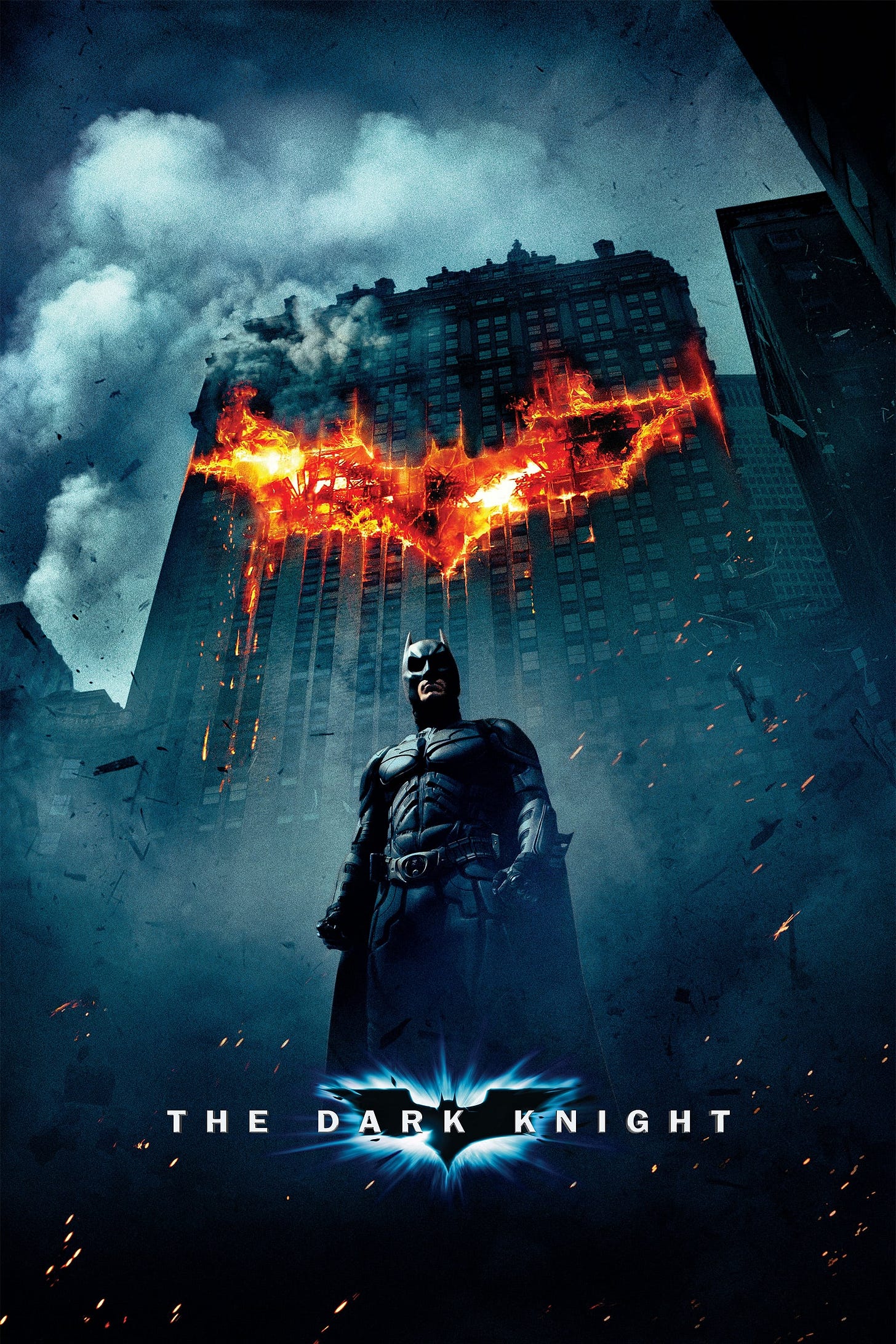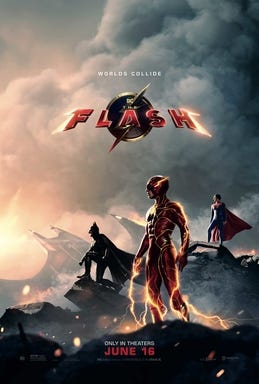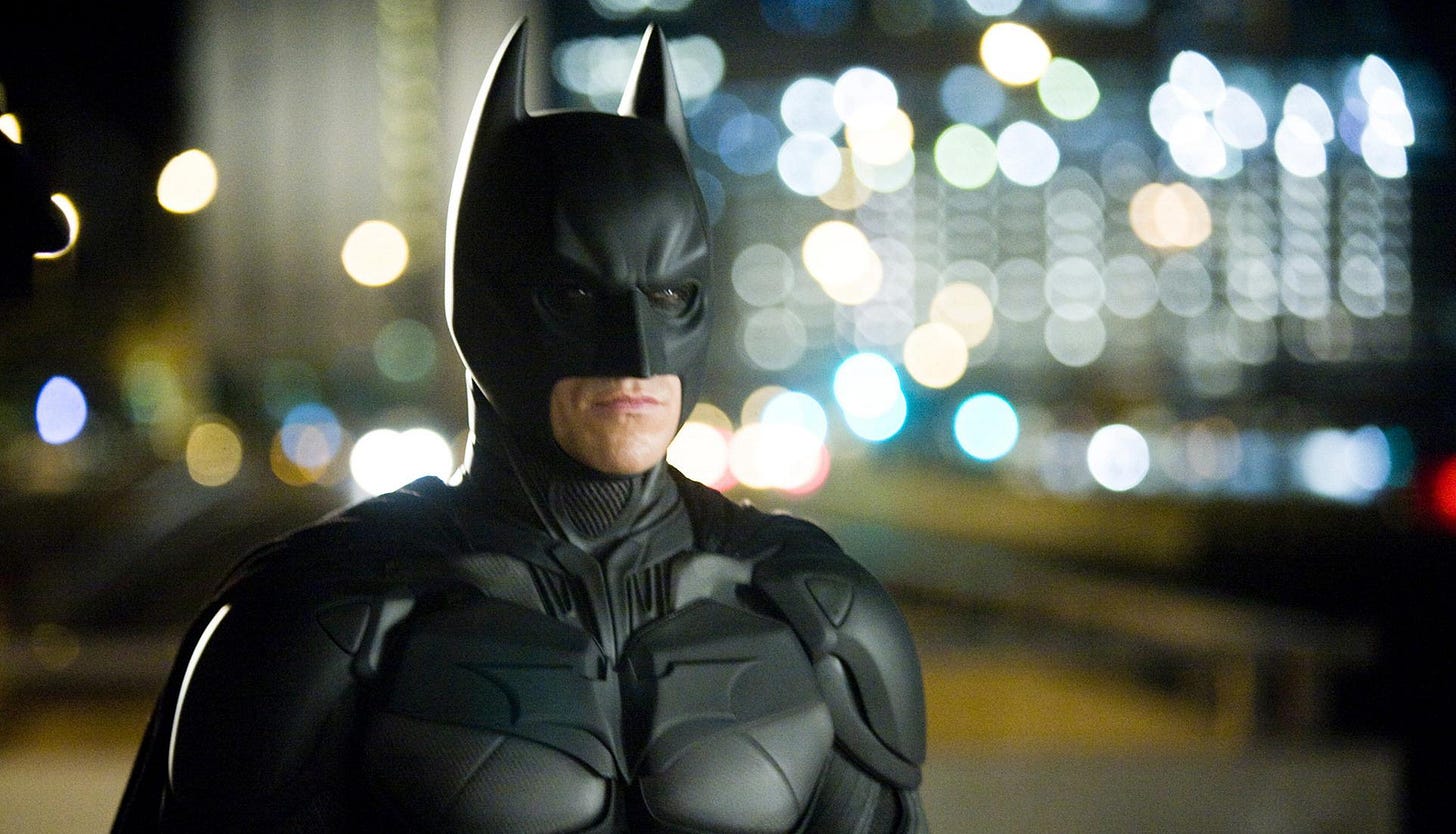The Dark Knight. Directed by Christopher Nolan, written by Christopher Nolan and David S. Goyer, featuring Christian Bale, Heath Ledger, Aaron Eckhart, Maggie Gyllenhaal, Gary Oldman, Morgan Freeman, and Michael Caine. Warner Brothers Pictures, 2008.
writes a lot about the problems inherent in cultural nostalgia when it rules the imagination. I’m fairly convinced by his arguments as they relate to the domination of the imagination through obsession with the past, particularly as it relates to music. Innovation is necessary for a culture to thrive.But I think nostalgia can be an aid to the imagination, especially when cultural artistic outlets prove to be dead ends. When Edmund Spenser wrote The Faerie Queene, the tale of Arthur had been done and was entering a period where parody might set in. But he rescued Arthur, not by just retelling it for his present sensibilities, but by drawing from the past to breathe new life into the story. Arthur’s tale merges with that of Aeneas, of Dante, and becomes something wholly unique in the process. As C. S. Lewis said,
We all want progress. But progress means getting nearer to the place where you want to be. And if you have taken a wrong turning, then to go forward does not get you any nearer. If you are on the wrong road, progress means doing an about-turn and walking back to the right road; and in that case the man who turns back soonest is the most progressive man. We have all seen this when doing arithmetic. When I have started a sum the wrong way, the sooner I admit this and go back and start again, the faster I shall get on. (Mere Christianity, 22)
Lewis is not talking about art here, but the principle applies. Much of what I have hoped to do here in these movie related Substack posts is to explore this idea, namely that we ought to turn back if we want to move forward. And since I do so love a good Batman film, I want to talk about the mess that has been DC movies. I’ve written about the problems I saw in The Flash (2023) previously.
The Flash (2023)
I intend to add movie reviews to my regular writing line up, alongside my already appearing book reviews. Like the books I write about, these will be a mix of films I’ve watched over the years and things still having their “cultural moment.” This first entry is about as “fresh on the mind” as it can get.
And for a long time, that post was my most read (it was recently displaced by my post on Shakespeare). The movie attempted to draw viewers in through nostalgic elements, but without actually understanding why viewers loved the old films. I’d like to suggest that this is why DC should return to the kind of artistic vision seen in Christopher Nolan’s Dark Knight Trilogy. While I think it is worth considering the films as a whole unit, like one ought to do with Peter Jackson’s Lord of the Rings Trilogy, I’m going to camp out on the second movie in Nolan’s series in this post.
To begin with, Christopher Nolan’s The Dark Knight is a brilliant film, both cinematically speaking and on a meaningful level as well. Of the three films, it best encapsulates the Batman ethos. It has the only dark ending of the three, though I remain convinced that this is necessary for the success of the third movie, The Dark Knight Rises (even the title is dependent on part 2’s ending). The Dark Knight is not a flawless movie, to be sure, but those missteps don’t create problems of meaning.
Nolan smartly crafted a story that could be enjoyed if you had not seen the first film. It picks up in media res, always a good sign, with the very clever bank heist put together by Heath Ledger’s Joker. The Joker had been teased at the end of Batman Begins, though the mysterious nature of that teaser continues throughout the second film. Where does he come from? Who is he? These common questions go unanswered. But most interestingly, Batman never asks them. It does not matter who the Joker is; it only matters what he is doing. This concept sets up the ending of the film, where Batman takes the fall (literally and metaphorically) for a heinous crime. And this final act directly addresses the theme of the whole series.
Each of Nolan’s films have contrasting themes. In Batman Begins, it is between fear and awe (opposing aspects of the same emotion: terror). Liam Neeson’s Ra’s al Ghul and Cillian Murphy’s Scarecrow represent unbridled fear, while Batman brings to Gotham a sense of awe, both terrible and inspiring. The Dark Knight explores the tension between chaos and order, with Aaron Eckhart’s Harvey Dent becoming twisted by both. The Dark Knight Rises reflects on both the previous thematic tensions, but also adds the war between light and dark. But behind each of the themes lies the overarching theme of Truth. And the ending of TDK brings that into focus.
The film thrives on reviving cliches while simultaneously rejecting overwrought tropes. The concept of “one bad day” has been explored in books and comics and films before. Michael Douglas’s turn in the Joel Schumacher film Falling Down stands out as one that initially tracks with this phrase. And the Joker makes it clear throughout the film that all he wants is to push people into those “one bad day” moments. At the same time, no background for the Joker is established. No traumatic childhood. No years of being bullied. His background doesn’t matter, certainly not like Batman’s does. Nolan presents the Joker as a character we cannot sympathize with because he is truly mad.1
It wasn’t hard. Because madness, as you know, is like gravity. All it needs is a little push.
In some sense, the Joker is the fulfillment of Shelley’s Queen Mab, though the villain’s vision of utopia is a distant cry from the English poet’s vision. Or perhaps the Joker has something in common with Moby Dick’s Flask, for whom the acceptance of being beaten by Ahab is a sign of wisdom (creating a reversal of real wisdom). However the Joker’s madness appears to the viewer, there is no doubt that he is an embodiment of chaos. So, will such “engines of chaos” always reign in this world? Can something put an end to the madness? Will it cost the pursuers of order their own lives?
I think Nolan is interested in these questions, but I also think they serve as minor distractions from the overarching theme. The Joker does not matter in the end; he is merely one step along the way towards Batman’s real struggle, the tension between truth and deception. His life is built around a kind of trick, a falsehood which enables him to be a force of justice in the world. But Nolan seems to be pushing the viewer to consider just how justice can operate if it is divorced from truth.
Because sometimes, truth isn’t good enough. Sometimes people deserve more. Sometimes people deserve to have their faith rewarded.
This statement from the hero at the end of TDK is unsatisfying, by design I think. The viewer ought normally to think the Watchful Protector is right. He has been so far. But the idea creates a problem as soon as it is uttered: how can a person be rewarded with a lie? Is it impossible for truth to reward faith? Will faith inevitably lead to disappointment because of how easy it is to fall in this life? The Dark Knight leaves off on this question. Of course, the audience ought to know this statement is false and ought to be wondering what this means for Batman. The World’s Greatest Detective doesn’t just abandon truth because of “one bad day,” after all. That would be exchanging wisdom for madness.
And perhaps the idea here is to make the audience feel as though the Joker did win in the end? Regardless, there would be another story to tell that showed all the ways in which Batman got this wrong. And The Dark Knight Rises really must be watched after one finishes TDK, because Nolan is not leaving the story here. Such stories provide an opportunity to ask the most important question of any work of art: is this true? (a question I’ve wrestled with before):
The Fine Art of Definition
My three-year-old son once asked me: “what is a flower?” I proceeded to give an explanation which detailed the nature of plants and photosynthesis and pollination. When finished, my son looked at me and said: “Okay, but what is it?” My child sought an answer that rose above a merely physical explanation; he desired to
Are the statements this movie makes about the human condition accurate? Or do they leave something to be desired? Is the audience brought up along with the character, even if he falls? The answer is yes, and Nolan’s trilogy stands out as one of the great stories of the last twenty years. “But its a superhero film!” Yes and no. There is no doubt that Marvel’s Kevin Feige pulled off something remarkable with the Marvel films culminating in Avengers: Endgame. But there were always going to be problems after that because, as I’ve already said, a story needs to have a terminus. Nolan’s Batman films understood from the first film, with a clear end always planned (even if the details were murky in the beginning).2 Nolan’s films really do stand apart because they don’t possess the kind of “Franchise” mentality often associated with such movies.
So, while it is fair to categorize superhero films as superficial and over reliant on spectacle, Nolan’s films prove that such movies can be intelligent, relying on the proper tropes to draw an audience into the story. Nolan’s trilogy works along the same lines of tripartite storytelling seen in the ancient Greek dramas, and much of Aristotle’s thoughts from Poetics are confirmed by what works in these films. If modern movie makers want to have success as Nolan did here, then they will need to abandon the “Easter egg” approach to story telling and ask hard questions instead. They will need to be in it for the long haul (three movies from 2005-2012) while remaining committed to telling a complete story. No sequels nor prequels, at least in the way they’re overused now.3 Stories need to have resolution even if they don’t cover every detail.4 And they ought to draw from the very best of the past, using source materials and well-trod paths of storytelling to flesh out characters and plots. If DC’s execs really want to succeed in the future, they would be wise to begin by reviewing the past.
It’s interesting that the Oxford English Dictionary claims that this usage is “offensive,” apparently because it lumps all mental illnesses into the same category. That’s stupid. Some mental illnesses should elicit sympathy from others, but the Joker’s case of madness is clearly not one of those (cf. https://www.oed.com/dictionary/mad_adj?tl=true#38505641).
If any critics have a problem with saying this kind of thing, I’d encourage you to read Dorothy Sayers’s The Mind of the Maker.
There was an animated film considered set in Nolan’s story, Batman: Gotham Knight. But it has never really been considered canonical.
The most obvious example of this is the story of Jesus in the Gospels. But one could think of many more examples: The Theban Cycle by Sophocles, Paradise Lost/Paradise Regain’d by John Milton, The Chronicles of Narnia by C. S. Lewis.










